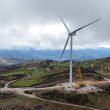As global leaders gather in Brazil for COP30, Ørsted has announced that it will meet its science-based 2025 decarbonisation target, reporting a 98 per cent reduction in scope 1 and 2 emissions since 2006.
The company, historically one of Europe’s more fossil-fuel-dependent utilities, now generates 99 per cent of its energy from renewable sources. Ørsted states that this marks the effective completion of its shift away from coal, oil and gas.
“We were founded on a promise to deliver green, affordable, and secure energy to governments around the world, and over the past years, we’ve built 18.5 GW of renewable energy,” said Ingrid Reumert, Senior Vice President for Global Stakeholder Relations. “With a 99 % renewable energy share and 98 % emissions reduction in line with science, we’re pleased to share that Ørsted’s green transformation is effectively complete.”
Reumert said the milestone comes amid record global temperatures. “As the past ten years are the warmest on record, emissions reductions across societies are more important than ever. We’ll continue to build out offshore wind in our core markets and will take the next steps in our decarbonisation journey with a focus on reducing our upstream and downstream carbon emissions towards 2040.”
According to Ørsted, its emissions cuts have been achieved through a combination of measures: expanding offshore wind and other renewable power, closing coal-fired combined heat and power plants or converting them to certified sustainable biomass, divesting oil and gas activities, electrifying its vehicle fleet, and sourcing renewable electricity for its own consumption.
The company says it will now focus on reducing emissions across its full value chain (scopes 1–3) in line with its 2040 net-zero target. Its roadmap includes efforts to lower emissions linked to materials such as steel and copper, and to maritime fuels.
With COP30 underway, Ørsted linked its announcement to the wider need for policy action. “This COP is about action,” Reumert said. “Rapid electrification through renewables is key to meeting climate targets. But in order to scale technologies such as offshore wind, governments need to provide predictability, attractive frameworks and certainty.”




















